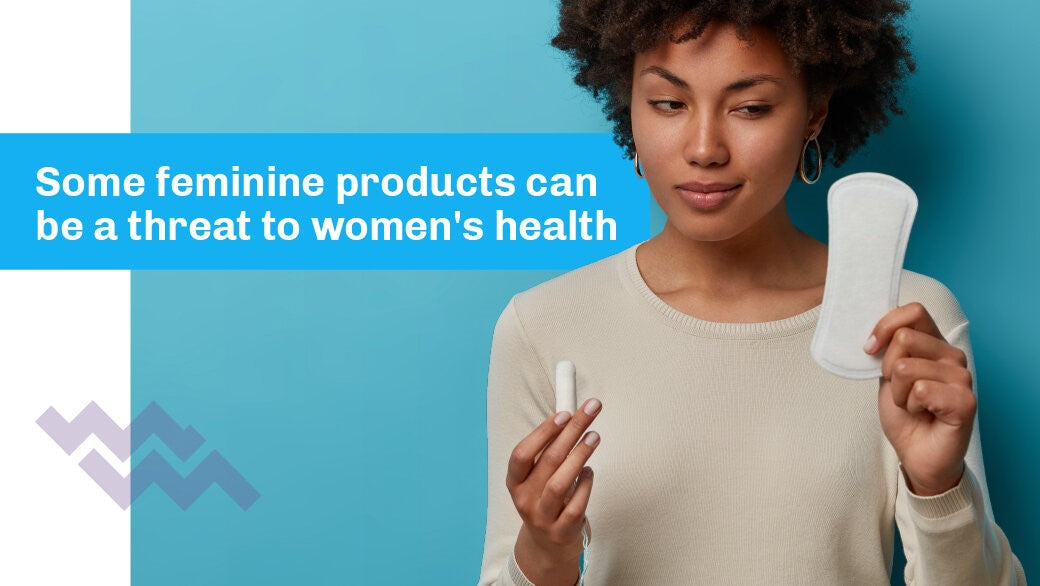Are There Toxic Chemicals in Your Feminine Hygiene Products?
Feminine hygiene products are essential to those who live with a menstrual cycle. However, these essential items can pack a toxic punch. What toxic chemicals are in feminine hygiene products? How can we avoid them? How will these chemicals affect me? What are the alternatives? Don't worry, we are here with a blog to take you through this issue and the healthy alternatives that are out there!

Recent research suggests yes.
In 2020, a study measured the concentrations of 24 different everyday toxic chemicals. These chemicals are also known as endocrine disrupting chemicals, or EDCs. Other studies have also found toxic chemicals in period products.
High amounts of phthalates, bisphenols, parabens, and triclocarban are present in:
-
Panty liners
-
Pads
-
Tampons
-
Wipes
-
Bacterial creams and solutions
There are also studies that found PFAS, nanosilver, and chlorine bleach in many popular period care products.
WHAT DOES THIS MEAN FOR YOUR HEALTH?
People who menstruate use these popular period hygiene products, not knowing that these toxic chemicals can lead to health issues. These include:
Chemicals from period care products are easily absorbed into the bloodstream. This is because they come in direct contact with sensitive and porous reproductive organs (vulvar skin and the vaginal mucosa). These recent findings suggest the need for both regulation and toxic-free alternatives.
WHAT CAN BE DONE?
Advocacy
The Women’s Voices for The Earth is an environmental non-profit organization. They focus on researching toxic chemicals found in cosmetics and household products, and have been influential in regards to this pressing issue. The organization put together a comprehensive timeline illustrating chemical testing in period products. Notable highlights are:
-
2002: A study found both dioxins and furans in tampons and diapers. These toxic chemicals are known to cause reproductive and immune system damage.
-
2020: A study published in the Sierra Magazine found toxic chemicals in the menstrual underwear brand, Thinx.
-
There was no evidence of toxic chemicals in Lunapads. Lunapads is a Vancouver based sustainable menstrual pad and underwear brand.
Both the Sierra Club and the Women’s Voices for the Earth are working hard to find solutions. They also push for government reform.
Government Legislation
-
In October 2019, New York’s Governor Cuomo signed the nation’s first legislation on this topic. This legislation requires disclosure of ingredients in menstrual products.
-
In June 2019, New York State Assembly member Linda B. Rosenthal supported the new legislation. She said, “Menstruators have a right to know the ingredients in products that they put in and on some of the most sensitive parts of their bodies.”
Other states, such as California, need this type of reform. The California AB 1989 bill aims to offer menstrual “equity.” Yet it still allows manufacturers to hide ingredients in many period care products.
-
In January 2020, Women’s Voices for Earth commented on this bill. They “applaud and support Assembly member Garcia’s commitment to menstrual equity.” They also feel that “AB 1989 is a step backward in important ingredient disclosure information.”
Both individuals and organizations have been working to spread awareness and push legislation. “Detox the Box” parties have become popular nationwide. These parties aim to raise discussion on the toxic chemicals present in menstrual product brands. More details are highlighted by the Women’s Voices for Earth.
WHAT CAN YOU DO?
Current social distancing guidelines make it difficult for you to throw your own detox the box party. But there are several steps you can take now to help make a difference and keep this conversation going:
-
Use non-toxic products. Invest in sustainable and organic brands such as Lunapads, LOLA, Veeda, and Rael. Our Million Marker list of Approved Products will soon feature non-toxic menstrual products.
-
Help take action! Keep up with reform and advocacy groups such as Women’s Voices for Earth, the Sierra Club, the Campaign for Safe Cosmetics, and the EWG.
-
Educate yourself. Continue to read and educate yourself about this issue, following up with new legislation.
Get tested! Test your exposure to everyday toxic chemicals like BPA and phthalates with a test kit from Million Marker. We can show you which chemicals you are being exposed to, and identify sources of exposures. What you know, you can change!
